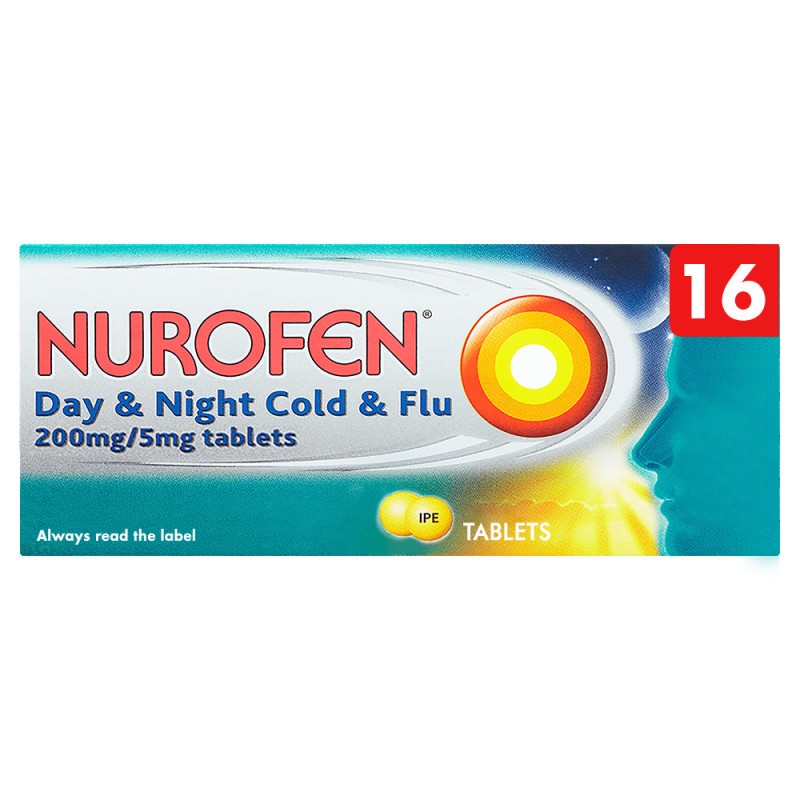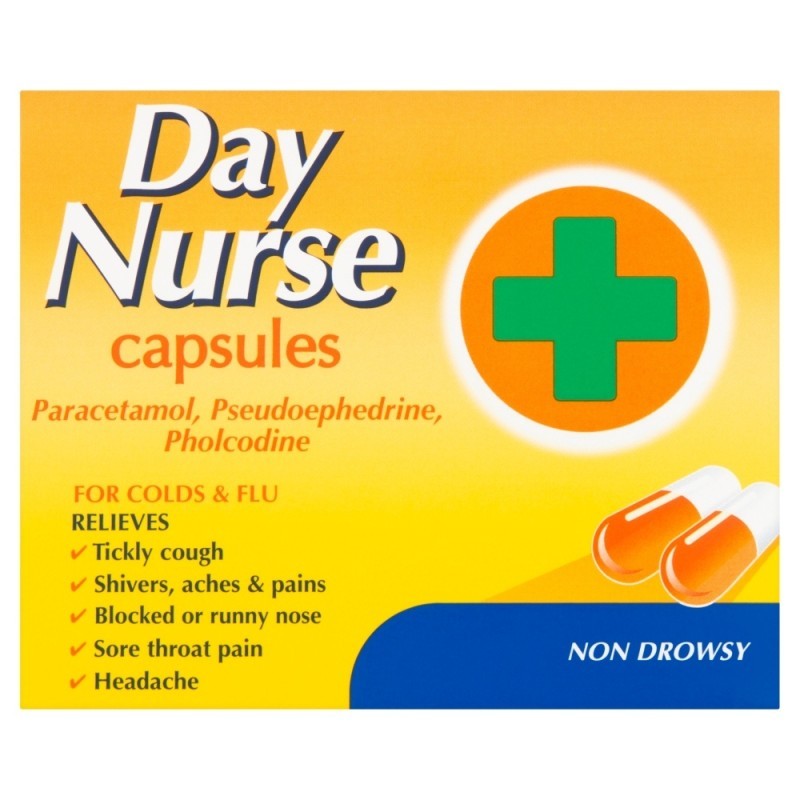- By Condition
- Medicines
- Healthcare
- Baby
- Vitamins
- Toiletries
- Skincare
- Summer Shop
- Men's
- Clearance
- By Condition
- Medicines
- Healthcare
- Baby
- Vitamins
- Toiletries
- Skincare
- Summer Shop
- Men's
- Clearance
Nurofen Day & Night Cold & Flu 200mg Tablets
Nurofen Day & Night Cold & Flu 200mg Tablets are ideal for quick relief during the day and throughout the night. Each capsule contains Ibuprofen to target aches and pains plus Phenylephrine Hydrochloride to ease congestion.
Who Can Use Nurofen Day & Night Cold & Flu Tablets?
Suitable for adults, the elderly and children aged 12 years and over.
Use for Nurofen Day & Night Cold & Flu Tablets:
- Blocked nose and sinuses
- Fever
- Aches and pains
- Headaches
- Sore throat
Tablets must be taken with water and swallowed whole.
It is important to drink plenty of fluids when suffering from colds and flu.
Adults, the elderly and children over 12 years:
This medicine is for short-term use only. Take the lowest dose for the shortest time necessary. Do not take Nurofen Day & Night Cold & Flu for longer than 10 days. If you do not get better, or get worse, talk to your doctor. They will tell you if it is safe to carry on taking the medicine.
Take two tablets up to 3 times a day. Leave at least four hours between doses and do not take more than 6 tablets in any 24hour period.
Do not give to children under 12 years
Do not take this medicine if you:
- are allergic to ibuprofen, phenylephrine hydrochloride or any other ingredients of this medicine (see section 6) or to aspirin or other painkillers
- have ever had a stomach ulcer, perforation or bleeding
- have had a worsening of asthma, skin rash, itchy runny nose or facial swelling when previously taking ibuprofen, aspirin or similar medicines
- have had gastrointestinal bleeding or perforation when previously taking NSAIDs (Non-Steroidal Anti-Inflammatory Drugs)
- are taking more than 75mg of aspirin a day. If you are on low-dose aspirin (up to 75mg daily) speak to your doctor or pharmacist before you take this medicine
- have severe liver or kidney problems
- have heart problems, high blood pressure or blood coagulation disorder
- have breathing difficulties
- have an overactive thyroid
- are taking or have taken within the last 14 days a medicine called monoamine oxidase inhibitor (usually used to treat depression)
- are in the last 3 months of pregnancy
- are under 12 years old
- have an enlarged prostate
Talk to your doctor or pharmacist before taking Nurofen if you:
Other warnings
Anti-inflammatory/pain-killer medicines such as ibuprofen may be associated with a small increased risk of heart attack or stroke, particularly when used at high doses. Do not exceed the recommended dose or duration of treatment.
You should discuss your treatment with your doctor or pharmacist before taking Nurofen if you:
- have heart problems including heart failure, angina (chest pain), or if you have had a heart attack, bypass surgery, peripheral artery disease (poor circulation in the legs or feet due to narrow or blocked arteries), or any kind of stroke (including ‘mini-stroke’ or transient ischaemic attack (TIA)).
- have high blood pressure, diabetes, high cholesterol, have a family history of heart disease or stroke, or if you are a smoker
If you get any of the following at any time during your treatment STOP TAKING the medicine and seek immediate medical help if you develop:
- signs of intestinal bleeding such as: bright red faeces (stools/motions), black tarry stools, vomiting blood or dark particles that look like coffee grounds.
- signs of serious allergic reaction such as: difficulties in breathing or unexplained wheezing, dizziness or faster heartbeat, severe forms of skin reactions such as itchiness, skin rash with redness, peeling, flaking or blistering (e.g.: Steven-Johnson syndrome), or swelling of your face, tongue or throat
- signs of kidney problems such as: passing less or more urine, cloudy urine or blood in urine, or pain in the back and/or swelling (particularly in the legs)
- signs of aseptic meningitis with neck stiffness, headache, feeling sick, being sick, fever or disorientation. Patients with autoimmune disorders (lupus, mixed connective-tissue disease) may be more likely to be affected.
- signs of blood disorder resulting in unexplained or unusual bruising or bleeding, fever, sore throat, mouth ulcers, flu-like symptoms and severe exhaustion
- signs of liver problems such as stomach pain, nausea, jaundice (yellowing of the skin and the whites of the eyes) or passing dark brown urine.
- a severe skin reaction known as DRESS syndrome can occur. Symptoms of DRESS include: skin rash, fever, swelling of lymph nodes and an increase of eosinophils (a type of white blood cells).
STOP TAKING the medicine and tell your doctor if you experience the following uncommon side effects which affect 1 to 10 users in 1,000:
- indigestion, heartburn or feeling sick
- pains in your stomach (abdomen) or other abnormal stomach problems.
TELL YOUR DOCTOR if you have any of the following side effects, they become worse or you notice any effects not listed:
Uncommon side effects which affect 1 to 10 users in 1,000:
- allergic reactions, such as skin rashes (urticaria), itching, peeling
- headaches
Rare side effects which affect 1 to 10 users in 10,000:
- flatulence (wind), diarrhoea, constipation and vomiting
Very rare side effects which affect less than 1 user in 10,000:
- drop in blood pressure or irregular heart beat
Side effects for which the frequency can not be estimated from available data:
- worsening of asthma or bronchospasm
- swelling (oedema), high blood pressure, heart failure or attack
- worsening of colitis and Crohn’s disease
- difficulties in passing urine (in men only).
Medicines such as Nurofen Day & Night Cold & Flu may be associated with a small increased risk of heart attack (myocardial infarction) or stroke.
Each tablet contains the active ingredients ibuprofen (200mg) and phenylephrine hydrochloride (5mg). The other ingredients are cellulose, sodium starch glycoate, hypromellose, magnesium stearate, talc, Mastercote yellow (contains Hydroxypropylmethyl Cellulose (E464), Titanium Dioxide (E171), Quinoline Aluminium Lake (E104) and Sunset Yellow Aluminium Lake (E110)) and black printing ink (contains shellac, iron oxide black (E172) and propylene glycol).









